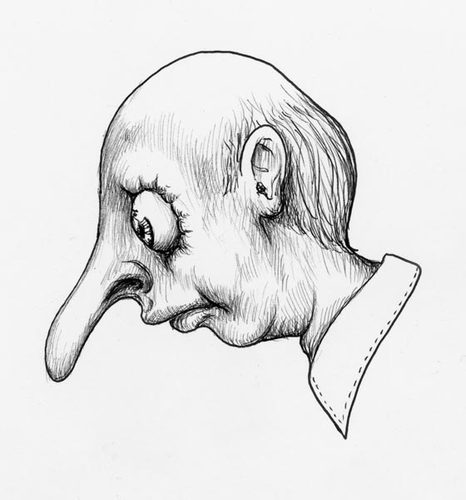Yet there's no debating that, culturally speaking, big noses are not desired the same way size is in, say, some other human organs. From the legend of Pinocchio's ever-expanding nose to Severus Snape's (of the Harry Potter series) hooked beak, the nose has never been quite meant as a sign of his sexual prowess, but as a sign of deceit and greed . Of course, big noses are also linked with a negative Jewish stereotype (see: Shylock, The Merchant of Venice), accentuating their reputation as harbingers of selfishness and malevolence.
Cyrano marks a clear, decisive break from this hard-nosed tradition, utilizing it as a symbol for his individuality, exceptionality and unmatched boldness. Cyrano's enemies attack his preposterous extra center-face flesh, and it's instructive that Valvert only finds it necessary to say Cyrano has a "big nose." A big nose, to Valvert's (admittedly puny) mind, speaks for itself--no further elaboration of the insult is necessary.
The nature of Cyrano's rebuttal, in one of the play's most magical scenes, reveals how he turns his nose against his foes. In Cyrano's criticism of Valvert's insult, he accuses Valvert of a lack of imagination, of "wit, or letters." Somewhat correctly, Cyrano equates Valvert's superficial blandness with Valvert's unimaginative mind, and continues the analogy to himself. Rather than allow his big nose to be mired in the usual assumptions, Cyrano equates it with a kind of exceptionality limited to him.
It's a powerful message--not just for those with large noses. Turning what makes you strange into what makes you unique may not seem easy, but Cyrano's ability to do so speaks lengths about his character.
(*Footnote: Of course, there's one awfully glaring hole in this line of logic: Cyrano's unbelievable sensitivity towards the topic of his nose, or as Carbon says, anywhere in the nose area. I tend to view this as one of the play's few flaws, an oversight on Rostand's part inconsistent with the Valvert scene and with Cyrano's character as a whole. For someone who professes such indifference to the opinions of the populace's "chattering curs," Cyrano is awfully averse to teasing about the size of his nose. If I ever reconcile this in my own mind, I'll let you know!)

I attended tonight's performance (Thursday, 7-22). I was the guy who got there early and was asking all kinds of questions.
ReplyDeleteI found the Warehouse's production refreshing, and in many ways unique. How often are the players mixed in with people walking their dogs, or pairs of "real" lovers rushing past the stage? Not often, and your group's staging made use of the unpredictable and that made all the difference.
I'll be sure to attend Romeo and Juliet which will probably be done in real time with the balcony scene under a real starry sky.
Oz
BTW: I have a blog here: ozcocoon.blogspot.com